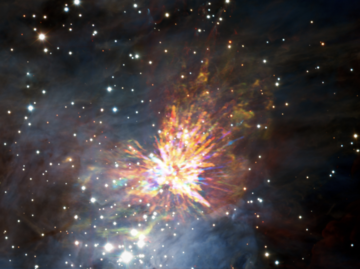2021/11/15 to 2021/11/23
On-line registration will open shortly. As in previous editions, the school will combine lectures on millimetre astronomy with observations using the 30-meter telescope. Lectures will be given by experienced scientists and 30-meter observers, covering a wide range of topics, including the study of the chemistry of interstellar clouds, low and high mass star formation, in the Milky Way, in nearby galaxies, and at high-redshifts. In addition, the school will include lectures on instrumentation, observing techniques, and data processing. This edition will highlight the synergies with the IRAM NOrthern Extended Millimetre Array (NOEMA). The lectures will be complemented by practical work using the 30-meter telescope. As usual, students, lecturers and technical assistants will form small groups, to work on one topic, preparing a science case, conducting the observations with the 30-meter telescope, reducing the data, and presenting first results on the last day of the school. However, unlike previous schools, where trainers and students performed their observations at the telescope site, in this edition all observations will be conducted in remote mode. The school is aimed at attracting new scientists to current and future single-dish millimetre and submillimetre facilities. The school is primarily meant for young researchers with little previous experience in mm-astronomy. Due to the constraints imposed by the practices at the telescope (even in remote mode), the school attendance will be limited to about 60 students who will be selected on the basis of their interests, experience, and references. Other considerations will be taken into account. In particular, we will strive to achieve balance in gender and geographical origin for attendees and lecturers.

 Es el grupo de radioastrónomos del IRyA y sus estudiantes. Nos reunimos cada 15 días con el objetivo de compartir experiencias, resultados recientes, resúmenes de congresos, etc. La imagen muestra uno de los resultados de los investigadores del grupo, basada en datos del Atacama Large Millimeter/submillimeter Array del flujo explosivo de Orion BN/KL (Bally, Zapata et al. 2017).
Es el grupo de radioastrónomos del IRyA y sus estudiantes. Nos reunimos cada 15 días con el objetivo de compartir experiencias, resultados recientes, resúmenes de congresos, etc. La imagen muestra uno de los resultados de los investigadores del grupo, basada en datos del Atacama Large Millimeter/submillimeter Array del flujo explosivo de Orion BN/KL (Bally, Zapata et al. 2017).